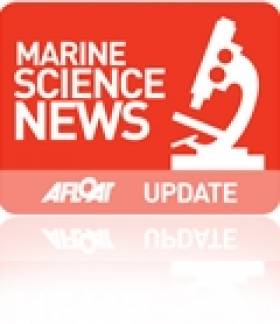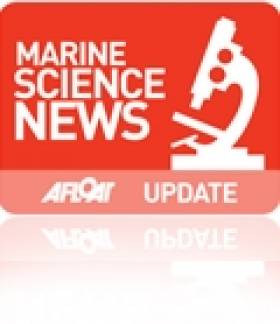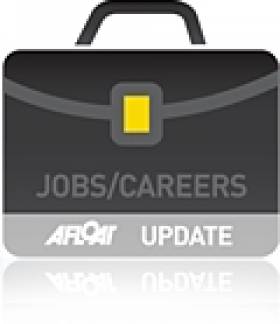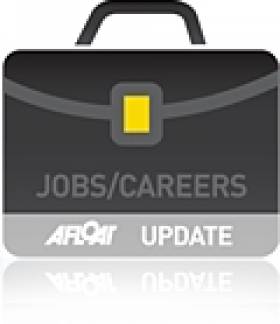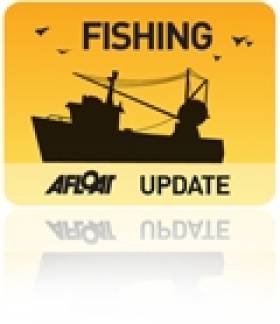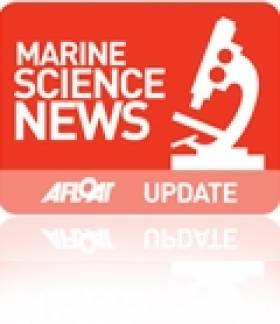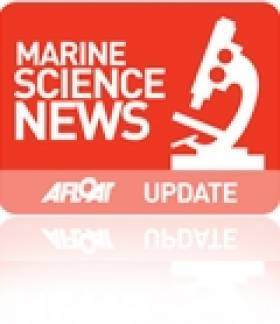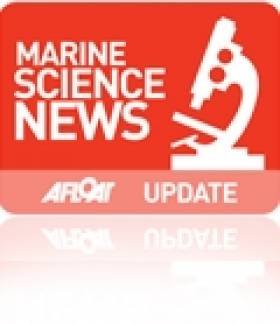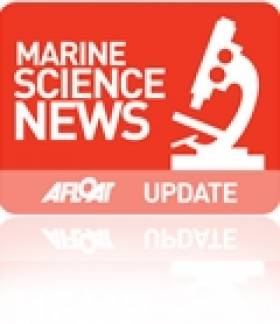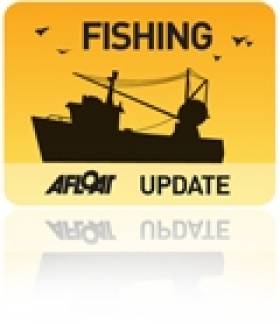Displaying items by tag: Marine Institute
EurOCEAN 2014 during Italian-EU Presidency Conference
#EurOCEAN – CEO of the Marine Institute, Dr Peter Heffernan yesterday welcomed the announcement of the EurOCEAN 2014 Conference in Rome recalling the very successful EurOCEAN 2004 Galway Conference and the 2004 Galway Declaration on Marine Science & Technology.
The Galway Declaration, and subsequent EurOCEAN Conference Declarations (Aberdeen, 2007 and Ostend, 2010), have made significant contributions to the EU's Marine Research Agenda and the Integrated Maritime Policy for the European Union (2007). He looked forward to an equally influential Declaration from the Rome Conference.
EurOCEAN 2014 (7th – 9th October 2014, Rome) will bring together marine scientists across the broad range of disciplines with policymakers, industry and NGOs, to develop a common vision on achieving an ecosystem approach to the management of Europe's marine resources as a fundamental requirement for sustainable Blue Growth. Highlighting the importance of Blue Growth and of commercially-driven, problem-oriented research, EurOCEAN 2014 will equally emphasize that a growing and sustainable maritime economy will also require a much greater knowledge and understanding of marine ecosystem functioning and resilience.
For 2.5 days EurOCEAN 2014 cover a combination of plenary sessions and parallel workshops, organized around societal, policy and regional challenges. The conference programme will reflect the high-level messages of the European Marine Board's Navigating the Future-IV Foresight Report.
The EurOCEAN 2014 conference is part of the successful EurOCEAN Conference Series initiated in late 1990s to provide a regular focal point for the marine and maritime research community and stakeholders to interact with European and member state policymakers and programme managers, to discuss and respond to new marine science and technology developments, challenges and opportunities.
EurOCEAN 2014 is an official event of the Italian EU Presidency and is co-organized by the European Marine Board, European Commission and the Italian EMB members, CNRS, OGS and CoNISMA.
For further information see: http://eurocean2014.eu/
#oceanology – The Marine Institute is at Oceanology International 2014 in London this week (11-13 March) promoting Ireland's fast growing marine technology sector and highlighting the opportunities to do business in Ireland.
Ireland's SmartOcean Pavilion (stand B500) sponsored by the Marine Institute showcases a range of products and services, such as smart control technologies for subsea remotely operated vehicles; subsea power cable fault finding; innovative data buoy and anti-fouling wiper equipment; and adjustable 'clutch fins' technology that can potentially double the output of wave energy devices.
Exhibitors at the Ireland Pavilion represent Ireland's growing SmartOcean cluster with displays by Mobile and Marine Robotics Research Centre (UL), SmartBay Ireland, Geomara, Jospa, IDS Monitoring, as well as INFOMAR (the Irish strategic National Seabed Survey by the Geological Survey of Ireland and Marine Institute), and Research Vessel Operations at the Marine Institute.
Dr. Peter Heffernan, CEO, Marine Institute said:
"We're delighted to take part in Oceanology International 2014 alongside some of Ireland's marine technology innovators. Ireland is a great place to do marine business right now, with a growing number of high tech marine and ocean energy companies developing novel products and services for international markets. And together with our national marine test-bed infrastructure in Galway Bay, Ireland is an ideal location to test and validate marine energy and subsea technologies."
The Marine Institute continues to develop Ireland's national marine test and validation facility for marine energy and subsea technologies in Galway Bay. The subsea observatory will include a standard telecommunications cable to provide power and high speed data communication between the shore station and a network of subsea data ports and surface buoys at the test site. The project is a national collaboration between the Marine Institute, SmartBay Ireland, Sustainable Energy Authority of Ireland and Hydraulics and Maritime Research Centre (UCC).
At OI2014, SmartBay Ireland is actively seeking companies with technology prototypes who wish to use this facility to test and validate novel sensors and equipment, for example Wave Energy Converters, Subsea Sensors, Data and Communications systems.
Visit us at the Ireland Pavilion to explore opportunities emerging through local and international initiatives such as Horizon 2020. Ireland is well positioned to work with Atlantic partners in the sustainable development of our ocean resource.
Ireland's SmartOcean Pavilion at OI14 supports the achievement of key actions from the Governments Integrated Marine Plan, Harnessing Our Ocean Wealth. A Development Task Force was set up last December, appointed by Minister Simon Coveney to progress these actions including: promoting Ireland as a good place to do marine business and supporting new and existing marine test and demonstration facilities.
Student Bursars Wanted for Work Experience Programme
#jobs – The Marine Institute is inviting students to apply for a number of work experience placements in many exciting areas for this summer 2014. The bursaries are worth €2,200 each for an eight week placement based in various locations including the Marine Institute, Oranmore, Co. Galway, Newport, Co. Mayo and Harcourt Street, Dublin and ports around the country.
The Marine Institute's Bursary Programme provides valuable practical experience for students, in areas of research such Marine Fisheries, Salmon Management, Aquaculture, Environment, Communications, Oceanography, Maritime Development and our EU Desk.
The Bursary Programme is aimed at undergraduates of Universities, Institutes of Technology and National Institutes for Higher Education. The Scheme is strictly limited to undergraduates who have completed two years study in a relevant discipline. Previous bursars have gone on to work in the Marine Institute (including two Directors of the Institute), BIM, Regional Fisheries Boards, county councils, pharmaceutical companies, State Laboratories, with some going as far afield as the EPA in Sydney Australia and some now running their own companies.
To Apply for the Summer Bursary Programme:
o Please check out the bursary titles on offer
o Select the two bursaries that interest you most and in order of preference
o Complete the Application Form and return it FAO Annette Jordan, Marine Institute, Furnace, Newport, Co Mayo
o Application Deadline Date is 7th February 2014
Irish Maritime Development Office Seeks Director
#marinejobs – The Marine Institute is seeking to employ a Director for the Irish Maritime Development Office (IMDO). A member of the senior management team, the Director will lead a small team providing a wide range of services both to the public and private sector, such as business development, policy support, market intelligence, education and contributing to the formulation of sectoral strategies. A key deliverable is the provision of reports and advice to the Department of Transport, Tourism and Sport, including the quarterly Transport Economist.
The Director will be primarily responsible for managing the process of innovation and strategy to support the continuous growth and development of the shipping services sector in Ireland. They will be engaged at a high level supporting development with maritime companies and organisations in Ireland while working with major international shipping groups and shipping lines already doing business in Ireland.
The successful candidate will work closely with government departments, external parties and key stakeholders, providing market intelligence and critical inputs to policy advice or future development and support
To be successful, the candidate will have a minimum of ten years direct experience in the national and international shipping sectors, ideally in the areas of ship management, ship broking, finance or maritime economics. The candidate will also have a relevant degree or equivalent professional qualification and experience. The candidate will have successfully managed programmes, people and resources at a senior and strategic level and been involved in communicating and building relationships with stakeholders.
A detailed job description can be downloaded from the current vacancies section of our website at www.marine.ie.
If you meet all of our requirements, we would be delighted to hear from you. Please send your letter of application and an up to date CV to Catherine Johnston, Human Resources Manager, Marine Institute, Rinville, Oranmore, Co Galway or email to [email protected]. Please note email applications will only be accepted at this address and applications are not valid until you have received confirmation of your application.
The closing date for receipt of applications is 17:00 on Tuesday 7th January 2014. Late applications will not be accepted.
The Marine Institute is an equal opportunities employer.
Farmed Fish Shows Compliance Says Government Body
#fishfarm – Residues levels in farmed finfish as monitored by the Marine Institute in accordance with the National Residue Control Plan (NRCP) showed no non-compliant results in 2012 for the seventh year running according to a Marine Institute statement.
The Department of Agriculture, Food and the Marine have now released the results of testing of food of animal origin carried out under the National Residue Control Plan for 2012.
The NCRP, which was approved by the European Commission, is an important component of the Department's food safety controls and is implemented under a service contract with the Food Safety Authority of Ireland.
Since 1999 The Marine Institute has implemented the National Residues Monitoring Programme for aquaculture. This is carried out on behalf of the Sea Fisheries Protection Authority (SFPA), which is the responsible organisation for residue controls on farmed finfish.
In 2012, in excess of 759 tests for 1,596 substance determinations were carried out on 169 samples of farmed finfish for a range of residues, including banned and unauthorised substances, various authorised veterinary treatments, and environmental contaminants. No non-compliant results were reported from the national monitoring programme for farmed finfish in 2012, continuing the welcome trend demonstrating an absence of residues over the last seven years.
More information on the residues programme can be found on the Marine Institute website and in the residues monitoring programme report Chemical Residue in Irish Farmed Finfish.
#marineinst – Marine Institute Bursary students seized the opportunity to showcase their talent and skills highlighting their experiences during their eight-week work placements with the Marine Institute at the annual Bursar Seminar day at the Institute recently (18th July 2013).
The Bursary programme at the Marine Institute provides 3rd level students with the skills and experience to further develop their careers within the marine sector. Twenty-six students from diverse fields of studies are gaining work experience in a variety of jobs including fish and shellfish assessments and surveys, corporate communications, sampling salmon and commercial fisheries in ports, assessments of maritime economics and oceanographic buoy development.
Mr. Joe Silke, Marine Environment and Food Safety Manager at the Marine Institute, spoke about the quality of the bursars work during their eight week placements and the confidence Ireland can have in the future of the marine industry. "The students have continued to demonstrate their understanding, and the overall context of the programmes within which they have worked. It is encouraging to see that we have a new cohort of highly motivated and engaged marine scientists coming through the third level system that will ensure Ireland retains its high reputation in marine science and technology into the coming decades".
The value of the Marine Institute Bursary Programme, historically is significant to the marine science sector explained Ms. Helen McCormick, Senior Laboratory Analyst at the Marine Institute. "The bursary programme has been ongoing since the 1960's and it gives students an opportunity to gain valuable experience within their chosen subject field. Previous bursars have gained various positions within the Marine Institute at all grades up to and including Director level."
"The Bursary Seminar Day is used to give students a chance to practice their presentations skills and provide information on their bursary to their peers. The standard of the presentations this year was extremely high and showed that during the short period of the student bursaries, they fully understood the subject matter and were able to communicate this to the audience," she added.
The Bursary programme is highly recognised and is aimed at undergraduates who have completed two years' study in a relevant discipline. This year bursars came from a total of twelve different third level institutes across Ireland and the UK including NUI Galway, NUI Maynooth, University of Ulster, Queen's University Belfast, Galway-Mayo Institute of Technology, Institute of Technology Tralee, University of Plymouth, Sligo Institute of Technology, Anglia Ruskin University, Dundalk Institute of Technology, University College Cork and Carlow Institute of Technology.
#MarineScience - Suitable candidates in the marine science field are invited to apply for the accredited continuous professional development module (CPD) titled Applied Marine Biological Sampling and Data Collection.
The module will take place from 30 September to 25 October 2013 and is offered by Galway-Mayo Institute of Technology (GMIT) and the Strategic Marine Alliance for Research and Training (SMART).
Applied Marine Biological Sampling and Data Collection aims to provide attendees with the detailed practical knowledge and skills necessary to design and implement biological sampling and data collection campaigns on marine commercial platforms.
The module is aimed at postgraduate students of marine science and marine industry personnel.
Four days of ship-time sampling and data collection onboard the RV Celtic Voyager and the IWDG's Celtic Mist off Cork and in the Shannon Estuary respectively are supported by three days of intensive laboratory practicals and lectures in GMIT.
- onboard, at practicals and lectures is required from 7-13 October with all other elements accomplished through student-centred distance learning.
Themes addressed include quantitative sampling of fisheries and benthos; surveying and monitoring methodologies for cetaceans and seabirds; tissue sampling and preservation; and oceanographic data collection and sampling.
Completion of the module results in an award of 5 credits at NFQ level 9 under the European Credit Transfer System (ECTS).
The Strategic Marine Alliance for Research and Training (SMART) is a marine science partnership programme designed to further develop capacity in carrying out offshore operations on board research vessels for third level students of marine-related science and technologies.
This strategic collaborative inter-institutional programme is led and funded by Irish Higher Education Institutions (HEIs) and the Marine Institute, and is also supported by the Higher Education Authority (HEA).
The online application forms is available HERE or my e-mailing [email protected]. Further details on the course and its instructors is included in a PDF available to read or download HERE.
Scientific Ship-Time Applications Now Open for 2014-2015
#ResearchShipTime – The Marine Institute are calling for applications for those wishing to accept ship-time on board the research vessels RV Celtic Explorer and RV Celtic Voyager in 2014 and 2015.
Applications for ship-time must be submitted using Research Vessel Operations' on-line 'Survey Planning System' (SPS) before 20th September 2013.
Applicants can get further information from the Apply for Ship-time pageApplications for ship-time must be submitted using Research Vessel Operations' on-line 'Survey Planning System' (SPS) before 20th September 2013.
Applicants can get further information from the Apply for Ship-time page on the Marine Institute website www.marine.ie and contact [email protected] to obtain login details to SPS.
Applicants should read The Vessel Charter Guidelines (.doc 256 KB) prior to submitting their application.
Applicants may seek grant-aid to cover all or part of the vessel charter costs.
For information on eligibility for grant-aid and additional application requirements please refer to the Grant-Aid Guidelines
Note: Applications for grant-aid will only be accepted for ship-time in 2014. Applications for grant-aid for ship-time in 2015 will be accepted in 2014.
Persons considering making an application for shiptime for training purposes are advised to consult with Strategic Marine Alliance for Research and Training (SMART) via [email protected].
This marine science partnership programme is designed to standardise and optimise ship based training for 3rd level students and provide nationally accredited ship based training activities.
The RV Celtic Explorer will once again be making transatlantic passages to complete a survey in Newfoundland waters in April 2014 (Westward) and May (Eastward) and a targeted call for applications to utilise these transects is being included in this year's call.
Applications are invited from researchers to utilise to utilise the vessel for up to a 14 day period on the western transect starting in mid-April 2014.
The initiative is planned to coincide with a planned charter survey in Newfoundland waters in April/May 2014 and is a precursor to future transatlantic co-operative research as outlined at the recent Atlantic Strategy meeting which included EU, US and Canadian Partners.
The PIP funding scheme will accept proposals for part funding of shiptime and full funding of associated research. For further information please go to their website: http://www.pip.ie/page/1
Marine Institute To Be Centre of Global Marine Research
#MarineScience - Galway Bay FM reports that the Marine Institute in Galway is to become one of the world's leading marine research centres.
The news comes in the wake of a groundbreaking deal signed in Galway on Friday afternoon (24 May) between the EU, the US and Canada to join forces on Atlantic Ocean research, as previously reported on Afloat.ie.
All partners have agreed to commit to funding to study the interplay of the Atlantic with the Arctic Ocean, and discover ways that research on the oceans and marine wildlife can contribute to scientific advances in other areas.
Meanwhile, a monitoring system for waste waters is among the projects that will benefit from a near €1 million in funding from the Science Foundation.
Research Minister Seán Sherlock announced the funding for projects at NUI Galway that is hoped to deliver "commercialisation of research in a range of areas".
Connemara Oyster Grounds To Lose Disease-Free Status
#Fishing - The Marine Institute is encouraging the agreement of a new code of practice for oyster fishing at Ballinakill Bay in Co Galway, which is set to lose its disease-free status.
Galway Bay FM reports that a single oyster out of 900 tested at the bay, near Letterfrack on the north-west coast of Connemara, tested positive for the Ostreid herpes virus two years ago as part of an EU-supported programme.
Though accounting for just 0.11% of the entire sample, the positive test is enough to strip the area of its clean status.
Senator Trevor O'Clochartaigh raised the issue in the Seanad last week, which prompted the Department of the Marine to confirm that the Marine Institute recommends a code of practice that would see the area's status eventually reinstated.



























